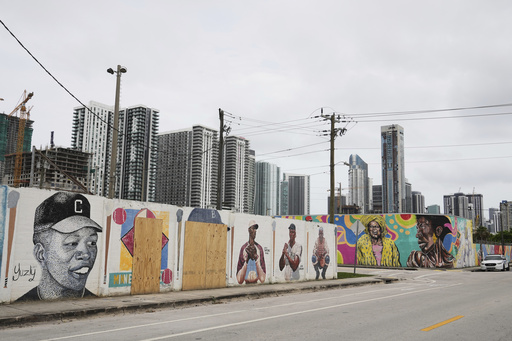In Miami’s Overtown neighborhood, authorities are currently investigating an incident of vandalism that targeted a mural featuring baseball icons Jackie Robinson and Minnie Miñoso. The artwork, part of a larger collection celebrating baseball giants, was defaced with hateful symbols and messages, as discovered over the weekend.
The disturbing damage to the mural was initially found by a young boy who questioned his mother about the graffiti, which included Nazi symbols. This unsettling discovery has prompted community leaders to speak out during a recent news conference. As a temporary measure, city officials have partially obscured the murals, which commemorate Robinson and Miñoso, an Afro-Cuban pioneer, using wooden panels. These artworks are located on a fence surrounding Dorsey Park, a historic venue for Negro League baseball.
Terrance Cribbs-Lorrant, an executive director affiliated with the city of Miami Black Police Precinct, expressed the need for transparency regarding the incident. “This vandalism must not be concealed; it reflects deep-rooted harm and hatred. We are compelled to uncover these truths rather than hiding them,” he stated.
Responding to the incident, U.S. Representative Sheila Cherfilus-McCormick addressed the community, condemning the vandalism as a hate crime. “This despicable act is aimed at spreading fear and division. However, we stand together, determined and united, affirming our commitment to truth, justice, and preserving our history,” she asserted.
Jackie Robinson is celebrated for breaking Major League Baseball’s color barrier in 1947 when he was signed by the Brooklyn Dodgers as the first Black player. Similarly, Minnie Miñoso holds a notable place in history as the league’s first Afro-Latino player and the inaugural Black player for the Chicago White Sox.
Since 2011, these murals have been displayed at Dorsey Park through a collaboration effort involving artists Kyle Holbrook and Kadir Nelson in conjunction with several community groups. As of now, no arrests have been made concerning the vandalism.
Dr. Saliha Nelson, CEO of Urgent, Inc., emphasized the cultural importance of the murals when she remarked, “This transcends mere vandalism—it represents an effort to silence our narrative. Yet, our voices will not be muted. We will restore this mural and continue to embrace this area as a beacon of empowerment, pride, and excellence.”



